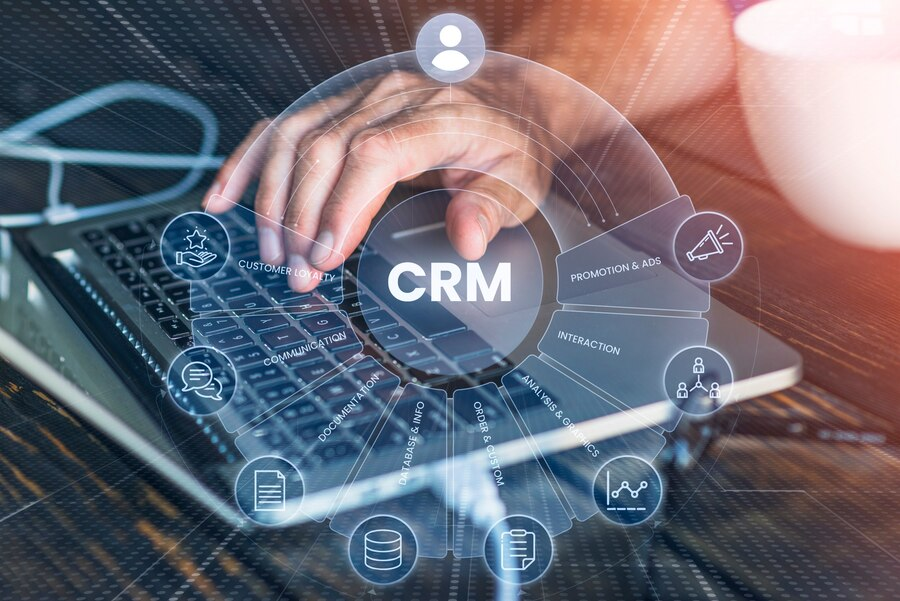Custom CRM Software for SMEs to Enhance Customer Management
Share

For small and medium-sized enterprises (SMEs), managing customer relationships efficiently is crucial to maintaining long-term growth. Unlike large corporations with extensive resources, SMEs must find cost-effective solutions to build strong customer engagement, increase sales, and streamline operations. This is where custom Customer Relationship Management (CRM) software comes in.
A tailored CRM system designed specifically for retail businesses enables SMEs to track customer interactions, analyze purchasing behavior, and automate personalized marketing campaigns. These features ensure higher customer retention, increased sales, and improved operational efficiency.
In this article, we will explore the importance of custom CRM software for SMEs, its essential features, and how it enhances customer management.

Why SMEs Need Custom CRM Software
CRM systems play a pivotal role in how businesses interact with their customers. While off-the-shelf CRM solutions are available, they often come with generic features that may not fully align with an SME's specific needs. A custom CRM system, on the other hand, is built to address the unique challenges of a retail business, ensuring seamless integration with its operations.
Key Benefits of a Custom CRM for SMEs
-
Personalized Customer Engagement
-
SMEs can track customer interactions, preferences, and purchase history to tailor marketing strategies.
-
Personalized promotions based on customer behavior lead to higher engagement and increased brand loyalty.
-
-
Enhanced Sales and Marketing Automation
-
A custom CRM can automate email campaigns, SMS reminders, and loyalty rewards, making marketing efforts more efficient.
-
AI-powered analytics suggest cross-selling and upselling opportunities based on customer purchase patterns.
-
-
Better Customer Retention and Satisfaction
-
CRM software enables SMEs to respond to customer inquiries faster and manage post-sales support effectively.
-
A centralized customer database ensures that sales representatives have all relevant customer information at their fingertips.
-
-
Improved Inventory and Sales Insights
-
CRM integration with inventory management systems allows businesses to suggest relevant products to customers based on real-time stock levels.
-
Sales data analysis helps retailers understand which products perform well and when to restock.
-
-
Scalability and Cost Efficiency
-
A custom CRM grows with the business, adding new features as needed without requiring a complete system overhaul.
-
SMEs avoid unnecessary licensing fees and features they do not use, reducing long-term operational costs.
-
Essential Features of a Custom CRM for SMEs
To fully leverage the benefits of a tailored CRM system, it should include the following essential features:
1. Centralized Customer Database
-
Stores all customer details, including contact information, purchase history, and preferences.
-
Enables sales teams to access data easily, leading to more personalized customer service.
2. Sales Pipeline Management
-
Tracks leads and sales stages to help businesses convert potential customers more efficiently.
-
Automates follow-ups to ensure no opportunity is missed.
3. Marketing Automation
-
Automates personalized emails, SMS reminders, and promotional offers.
-
AI-based recommendations suggest targeted product promotions based on customer behavior.
4. AI-Powered Analytics and Reporting
-
Provides real-time reports on sales performance, customer behavior, and marketing effectiveness.
-
Uses predictive analytics to suggest best-selling products and peak shopping times.
5. Integration with POS and Inventory Management
-
Ensures a seamless connection between sales data and stock levels.
-
Helps avoid stockouts by notifying staff when inventory is running low.
6. Customer Support and Ticketing System
-
Enables businesses to handle inquiries, complaints, and service requests efficiently.
-
Tracks customer interactions to improve the overall service experience.
7. Mobile Access and Cloud Integration
-
Allows SMEs to access customer data and manage sales from any device.
-
Cloud-based CRM ensures data security and remote access for business owners.
Use Case: Tailored CRM System for a Retail Business
Challenges Faced by a Retail Business Without a CRM
-
Customer data was scattered across multiple spreadsheets and notebooks, making it difficult to track purchase history.
-
Sales teams struggled to follow up with potential leads, resulting in missed opportunities.
-
The business lacked insights into customer buying patterns, leading to ineffective promotions.
-
Stock management was manual, often resulting in overstocking or stock shortages.
How a Custom CRM Solved These Problems
-
Centralized Customer Information
-
The CRM created a single database for all customer details, enabling sales teams to access relevant information instantly.
-
-
Automated Follow-ups and Loyalty Programs
-
The system sent personalized reminders for promotions, discounts, and new arrivals, increasing customer engagement.
-
-
AI-Driven Sales Insights
-
By analyzing past purchases, the CRM recommended relevant products to each customer, improving sales.
-
-
Seamless POS and Inventory Integration
-
The CRM system linked directly to the point-of-sale (POS) system, ensuring real-time stock updates.
-
Staff members received alerts when popular products were running low, preventing missed sales.
-
Results After CRM Implementation
-
30% increase in customer retention due to targeted promotions.
-
40% reduction in missed follow-ups, leading to higher conversion rates.
-
More efficient inventory management, reducing stock-related losses by 25%.
How to Choose the Right Custom CRM for Your SME
When selecting a CRM system, SMEs should consider the following factors:
-
Business Needs and Customization Options
-
Ensure the CRM aligns with your industry and business model.
-
Look for customization capabilities to tailor features to specific workflows.
-
-
Ease of Use and Mobile Accessibility
-
Choose a CRM with an intuitive interface that requires minimal training.
-
Mobile-friendly CRM solutions enable sales teams to work efficiently on the go.
-
-
Integration Capabilities
-
The CRM should seamlessly integrate with existing POS, inventory, accounting, and marketing tools.
-
-
Security and Data Protection
-
Ensure the CRM has strong encryption and user access controls to protect customer data.
-
-
Scalability and Cost-Effectiveness
-
Choose a solution that allows for future upgrades without excessive costs.
-
Common Mistakes SMEs Should Avoid When Implementing CRM Software
-
Ignoring Employee Training – A CRM is only as effective as the team using it. Ensure staff are properly trained.
-
Choosing a Generic CRM with Unnecessary Features – Opt for a custom CRM that meets the specific needs of your business.
-
Not Integrating CRM with Other Business Systems – A CRM should connect seamlessly with inventory, sales, and accounting software.
-
Failing to Leverage AI and Automation – Businesses should maximize automation features to improve efficiency.
Conclusion
A custom CRM system tailored for SMEs enhances customer management, increases sales, and optimizes business operations. By tracking customer interactions, analyzing purchase behavior, and automating marketing efforts, SMEs can improve customer retention and boost revenue.
With the right CRM solution, SMEs can move beyond traditional customer management methods and create a more personalized and data-driven customer experience. Investing in a tailored CRM is not just about technology—it’s about building stronger relationships and driving long-term business success.

Share

Keep me postedto follow product news, latest in technology, solutions, and updates
Related articles
Explore all


